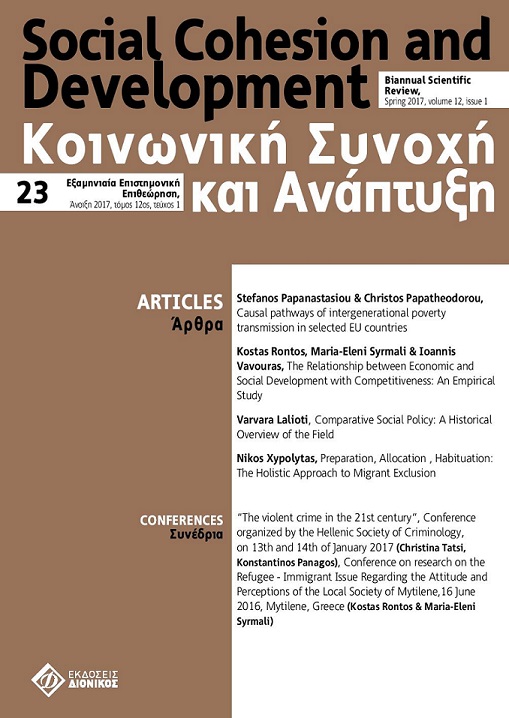Preparation / Allocation / Habituation: The Holistic Approach to Migrant Exclusion

Abstract
The article establishes a theoretical approach to migrant exclusion based on recent research and focuses on the importance of the experience and organization of work. The holistic approach recognizes three important
stages in the process of exclusion: i) the preparation of future migrants in the country of origin through the integration and cultural acclimatization to casual and low-status work, ii) the allocation of migrant workers in low-status jobs in the host countries and iii) the habituation of migrant
workers to the characteristics and demands of their work which leads to the reproduction of their social position.
Article Details
- How to Cite
-
Xypolytas, N. (2018). Preparation / Allocation / Habituation: The Holistic Approach to Migrant Exclusion. Social Cohesion and Development, 12(1), 57–71. https://doi.org/10.12681/scad.15945
- Issue
- Vol. 12 No. 1 (2017)
- Section
- Articles

This work is licensed under a Creative Commons Attribution-NonCommercial-ShareAlike 4.0 International License.
Authors who publish with this journal agree to the following terms:
- Authors retain copyright and grant the journal right of first publication with the work simultaneously licensed under a Creative Commons Attribution Non-Commercial License that allows others to share the work with an acknowledgement of the work's authorship and initial publication in this journal.
- Authors are able to enter into separate, additional contractual arrangements for the non-exclusive distribution of the journal's published version of the work (e.g. post it to an institutional repository or publish it in a book), with an acknowledgement of its initial publication in this journal.
- Authors are permitted and encouraged to post their work online (preferably in institutional repositories or on their website) prior to and during the submission process, as it can lead to productive exchanges, as well as earlier and greater citation of published work (See The Effect of Open Access).


